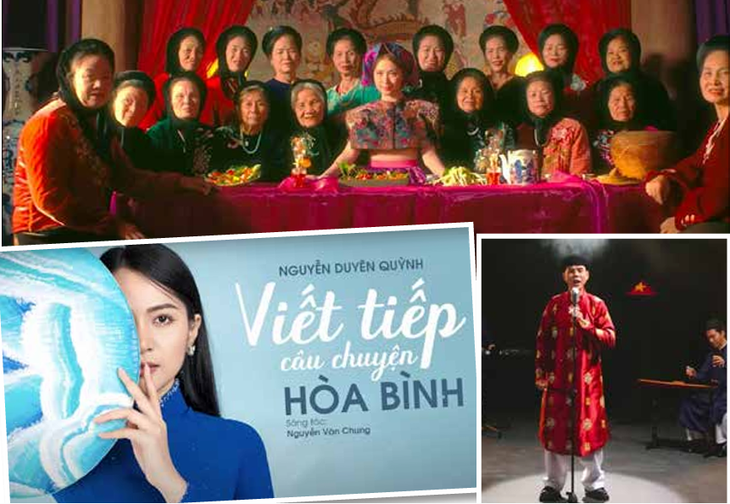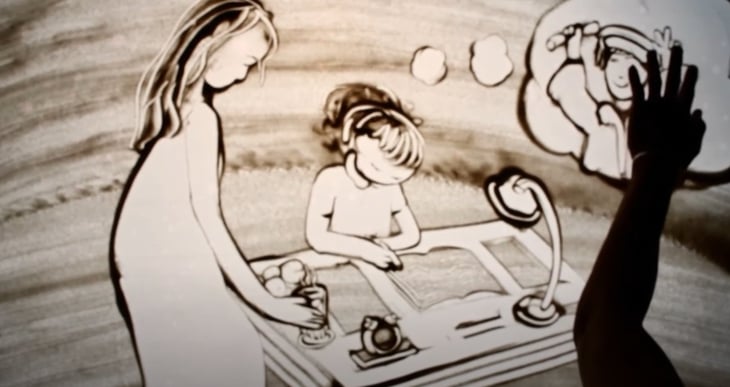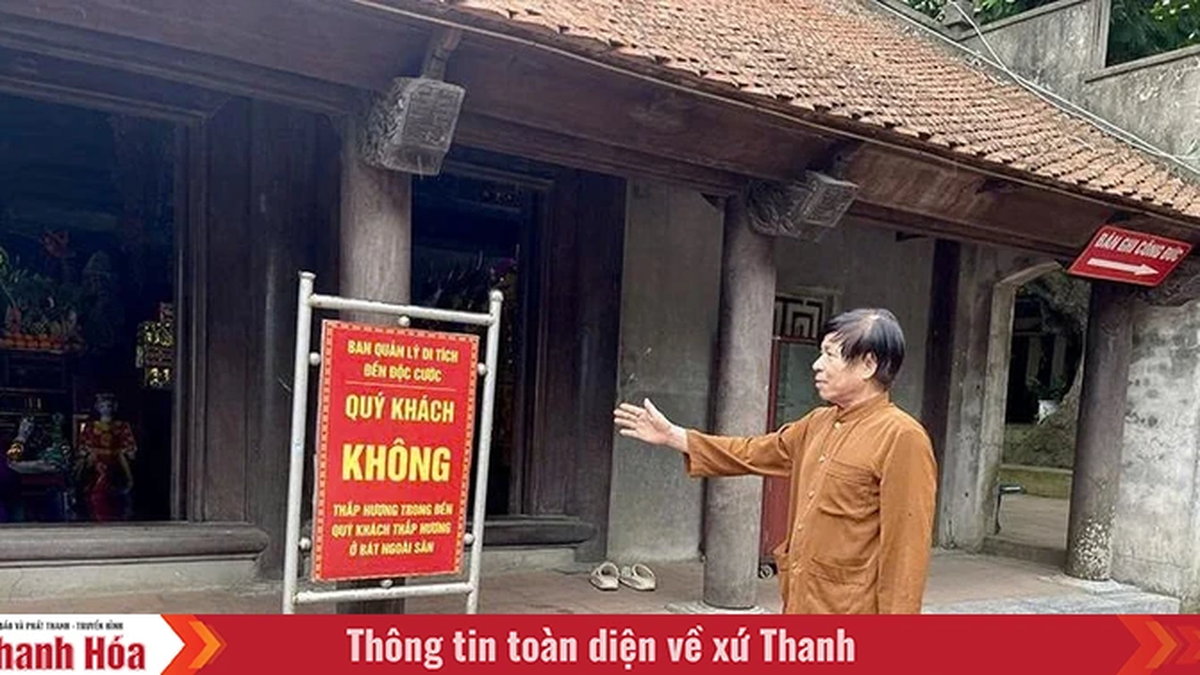
Some music videos that have become a trend recently - Screenshot
Journey of a digital song
When Hoa Minzy's music video Bac Bling reached 100 million views on YouTube just one month after its release, experts estimated that the female singer could earn 3.6 - 5.1 billion VND from YouTube Ads and digital music platforms such as Spotify and Apple Music (digital music accounts for 70 - 80% of revenue).
But the female singer once frankly said: "The money I get from YouTube is insignificant compared to what I have spent."
In short, the digital music industry operates through three stages: production, distribution, and communication.
At the production stage, indie artists often manage a small team, from writing to recording. Some artists also work with management companies to receive strategic support.
The release phase requires cooperation with record labels or digital music publishers to put songs on Spotify, Apple Music... These units are responsible for synchronizing all identifying data such as song title, artist, genre... so that the platform can identify and distribute accurately.
Finally, the media, especially the social network TikTok, has contributed to changing the way of promotion: just 15 seconds of catchy music is enough to create a trend, helping artists test audience reactions before officially launching.
Short content such as remixes, behind-the-scenes, and covers are also easy to attract Vietnamese viewers. Digital platforms also support market expansion, such as Spotify's EQUAL campaign, which helps Vietnamese female artists like Dong Nhi reach international audiences and global media.
Money from digital music: more than just listens
Music streaming platforms allow audiences to opt for paid plans to listen to copyrighted songs on-demand from a centralized library; while some platforms allow users to listen to music for free, interspersed with advertisements.
In Vietnam, there are domestic and international platforms such as Zing MP3, NhacCuaTui, Spotify, Apple Music... but according to the Vietnam Digital Music Industry Overview Report 2024 conducted by the research team of the Faculty of Communication and Design at RMIT University Vietnam, YouTube, TikTok and Zing MP3 are the three most used platforms.
But how much money does a song played on Spotify, Apple Music or Zing MP3 make? On average, Spotify pays $0.003 - $0.005 per stream. But artists don’t receive this money directly. The platform uses a proportional distribution model, calculating total revenue based on multiple metrics and the platform keeps 30% while the remaining 70% is distributed to copyright owners (artists, songwriters or producers).
According to Ms. Ton Nu Nhu Ngoc, an expert in artist management and digital music, each listen on the platform will be converted into money depending on many factors, such as whether the listener's account is paid or free. This revenue is transferred to the publisher, then divided back to the artist based on the agreement between the two parties.
"The revenue sharing ratio between publishers and artists depends on the signed contract. There is no fixed formula that applies universally," said Ms. Ngoc.
There are many different models of collaboration. Artists can choose a complete package from production to promotion, or they can use only a portion of the services from the publishing company. Depending on the level of involvement of each party, artists can receive from 10 to 70% of the revenue from the recording.
Copyright, human resources and the shadow of AI
Despite rapid growth, Vietnam’s digital music industry still faces many barriers. According to Ms. Le Nguyen Tra My, a member of the Ho Chi Minh City Blockchain Association, in 2024 there will be about 80 lawsuits related to music copyright in Vietnam, when songs are used on many platforms without the permission of the owners.
At the same time, about 80% of artists do not own copyright to their works due to lack of legal knowledge or having signed unfavorable contracts.
"Get a good lawyer" is the advice billionaire singer Taylor Swift gives to anyone who wants to enter the music industry and survive long term.
In fact, many artists sign unfavorable contracts just because their names are mentioned, not realizing that they have just given up copyright, and even intellectual property rights.
An entertainment industry expert recommends: "If you feel you cannot learn or understand all the laws, hire a lawyer. Don't trust any individual or company that says they will help you."
The industry is also lacking in human resources, according to Ms. Ton Nu Nhu Ngoc, people who work in communications are good at their profession but not familiar with market analysis data, and people who know how to do business are ignorant about the law.
Copyright, while lawyers are good at arguing but lack the ability to negotiate business. At the same time, copyright issues are becoming more complicated as AI becomes more popular. Music created by AI is not clearly protected by law, posing the risk of copying or disputes.
"The Vietnamese music industry has great potential for development, but the fundamental factors still have many shortcomings," said Dr. Nguyen Van Thang Long, RMIT University Vietnam.
He believes that arbitrary breaches of agreements or unprofessional settlement of disputes still occur. Awareness and respect for copyright and authorship rights are also not given due attention by all parties. These are limitations that need to be improved for a sustainable music industry.
Many singers have a significant annual revenue.
According to information compiled from many channels, including Social Blade (data is for reference only, as it depends on many factors such as revenue sharing ratio of each channel, number of ad impressions...), it is estimated that a music video reaching 1 million views on YouTube can bring in about 500 USD (more than 12 million VND).
The YouTube channel of singer M., who is considered one of the most prominent young stars in Vpop today, is estimated to generate revenue of 2-32 billion VND/year. In addition, each of his live performances attracts thousands of viewers, with a salary from the organizer of about 1 billion VND.
Singer M., who recently rose to fame with a song honoring Vietnamese cultural traditions, also owns a YouTube channel with revenue ranging from 1.4-23.3 billion VND/year.
According to statistics from the Social Blade platform, singer Phan Dinh Tung's YouTube channel has an estimated monthly revenue of 19-320 million VND, equivalent to about 240 million to 3.8 billion VND/year...
In addition to digital music, artists earn money from live performances, exclusive product sales and copyrights used in advertising and movies. According to data from Zing MP3 and Adtima on loyal fans: about 87.5% are willing to buy goods in exchange for exclusive products and services related to their idols; 71.6% spend on texting stickers with their idols' images.
Musician NGUYEN VAN CHUNG:
Must adapt if not left behind
Releasing music on digital platforms is a mandatory trend of the times that musicians must also adapt to if they do not want to be left behind in that flow. Musicians must also update the listening trends of each audience to come up with appropriate strategies (older audiences often go to YouTube, young audiences listen on TikTok or Spotify). Releasing digital music has several advantages: it is fast, reaches the audience more directly, measures audience feedback faster, and saves significant costs compared to printing CDs...

Mother's Diary (Nguyen Van Chung) is one of the songs that is listened to over and over again online - Screenshot
In addition, the author also earns money from royalties as well as the number of listens to the product on the platforms. The amount is not much compared to singers recording, but anyway, it is still a number that makes me satisfied, investing back into new compositions.
However, digital music today also faces many challenges: AI intervention, copyright infringement, and easy uploading leading to a decline in content quality (although sound/image quality may be better).
Each platform has a different way of communicating. For example, the trend of 45-second short videos, which makes listeners focus only on the catchiest part of the music, leads to ease in composition and incomplete access to the beauty and spirit of the music... However, this is the rule of the game on each platform that participating artists must also accept.
Source: https://tuoitre.vn/nhac-so-moi-luot-nghe-truc-tuyen-mang-ve-bao-nhieu-tien-cho-nghe-si-viet-20250511225350989.htm



















































![[Maritime News] More than 80% of global container shipping capacity is in the hands of MSC and major shipping alliances](https://vphoto.vietnam.vn/thumb/402x226/vietnam/resource/IMAGE/2025/7/16/6b4d586c984b4cbf8c5680352b9eaeb0)













































Comment (0)